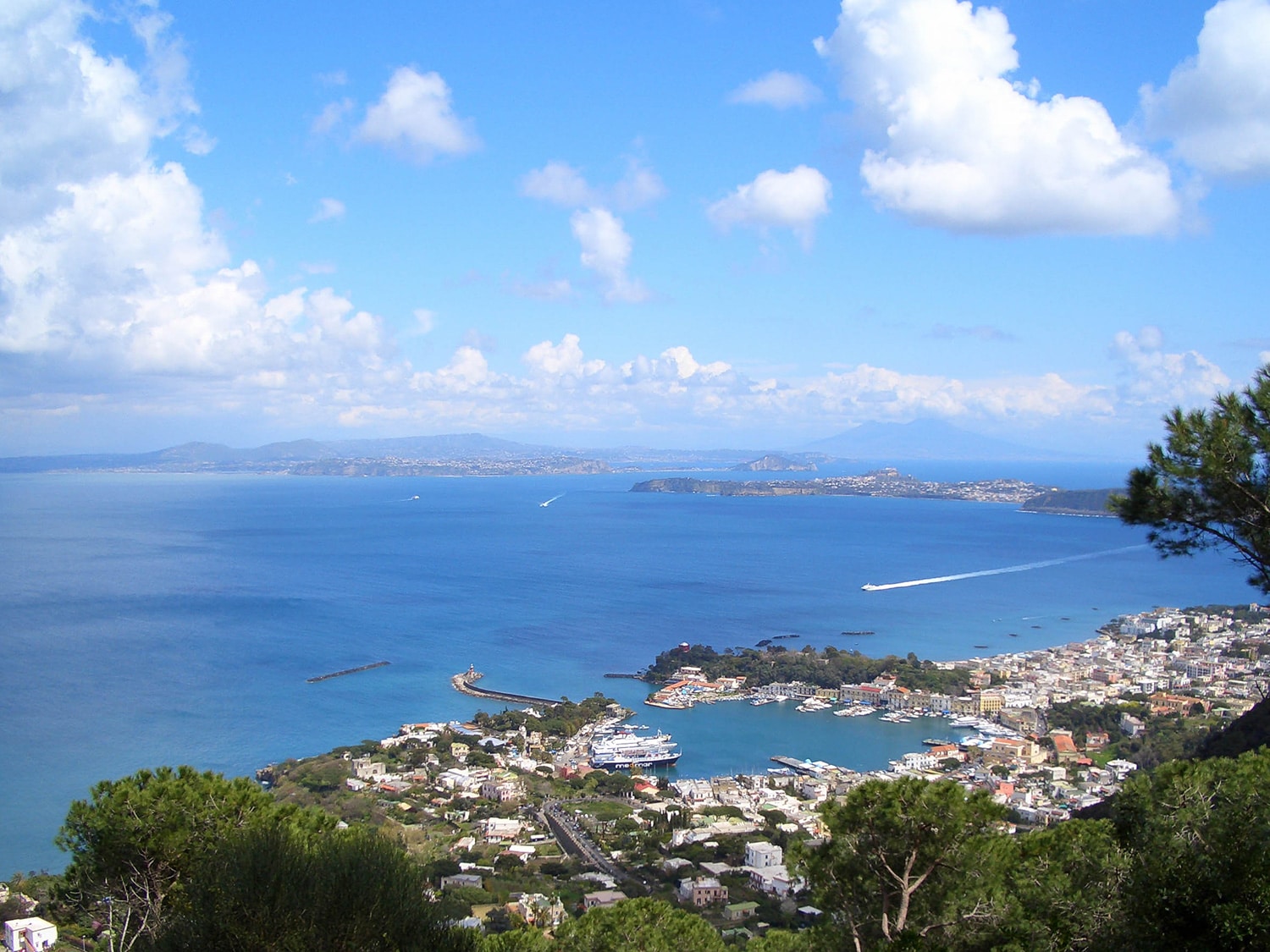The Island Where The Horses Run Free
Experience mythology, magic, and the mastery of Bartolo Messina on Italy’s Ischia.
"Do you know that the Panda is named for Empanda, the goddess of hospitality? That's why it's the unofficial car of Ischia: it's divine and ancient." Michele winked as his once-upon-a-time lime-green Fiat crawled along streets that seemed to be carved out of volcanic rock and which should not have even attempted to accommodate one, let alone two, lanes of traffic. If the Fiat 500 is an icon, the first-generation Fiat Panda is an institution—where the former boasts curved lines and dainty hardware, the latter is a boxy, trundling clodhopper. Ask any tourist what car they'd want to drive around the island and the lion's share will evoke the classic 500. Ask an ischitano and they'll tell you, almost without question, to take the Panda.
Michele had won a heated debate over aperitivo the evening before and was consequently anointed unofficial guide and driver of the trip. But he sat bolt upright in his chair when I told him that our first appointment was with an equestrian performer at his riding club in Barano d'Ischia, near the Maddalena forest. "Of course I know him," Michele said after a low whistle, "everyone knows everyone on this island. But I don't know him, you know? Even for Ischia, he is a bit of a mystery."
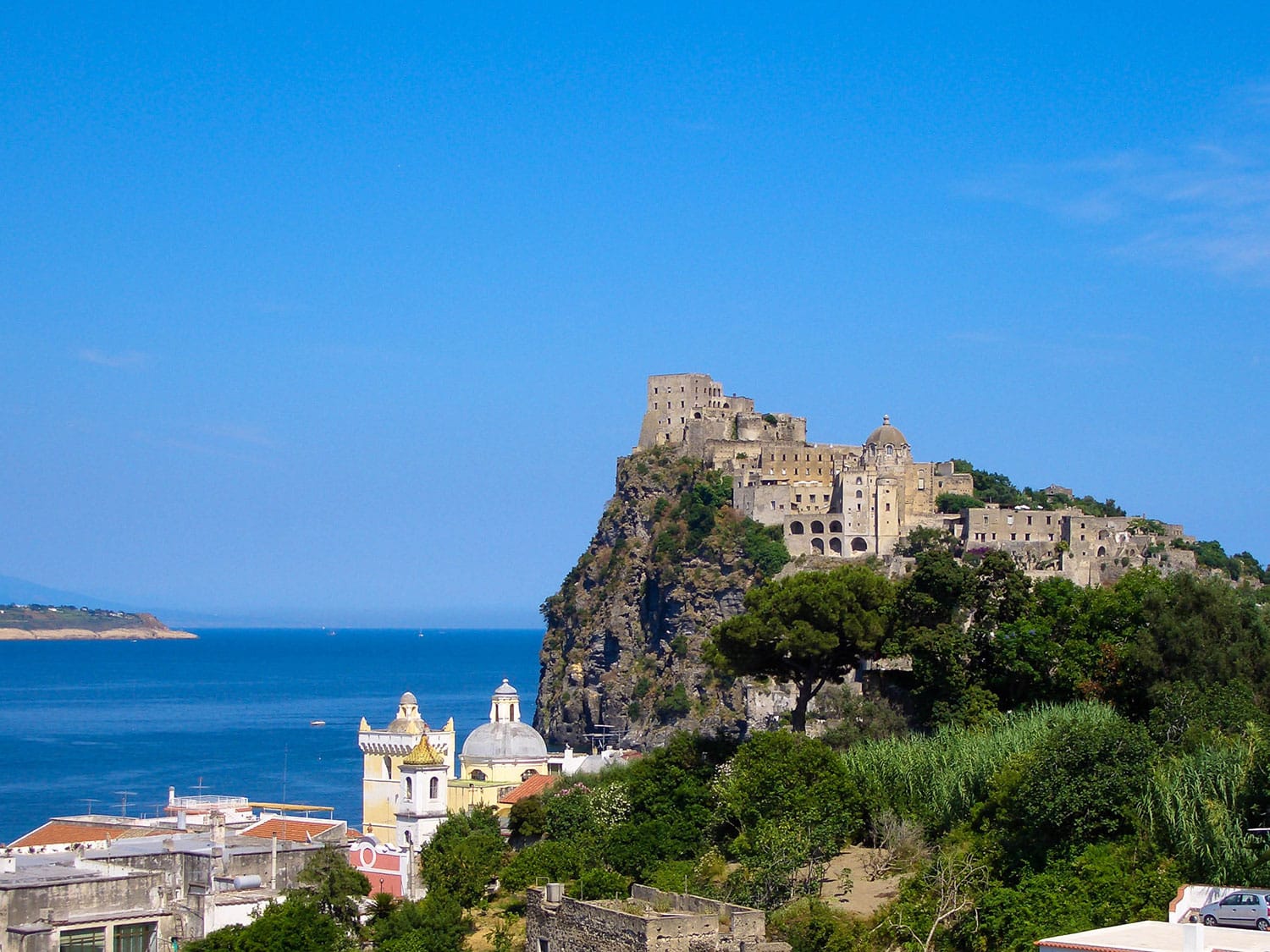
The following morning, we made our way deeper and higher into the island. The ancient Castello Aragonese lording over the port and the Bay of Naples behind it, acting as both guardian and gatekeeper for one of Italy's greatest secrets. The famous azure blue Italian skies were nowhere to be found; instead, the steely grey sky was filled with inky, fast-moving clouds that shrouded the harbor and covered the horizon. Indeed, it would have seemed as though we were scaling a cliff if it didn't already seem like we were floating in mid air.
Michele's hands gesticulated in all four cardinal points at once while simultaneously commanding a car with no power steering through lanes that were bordered on one side by solidified magma and a churning sea on the other. Like a latter-day Kali, he pointed out Greek, Roman, Phoenician, and Etruscan ruins as easily as he motioned to caffès that once hosted Elizabeth Taylor and Richard Burton without ever missing a wave or wink to a passing driver.
As we corked into an 87-degree angle towards the last winding climb before our destination, he pulled the emergency brake and we sat like wayward parachuters stuck in a tree. "We also have to get bread on the way back, so let's try to get done before lunchtime, ok? There is a place we must go, the last great panificio on Ischia. Did you know that Empanda is also the goddess of bread? It's true!" And with another wink and a grin, Michele snapped the brake and we fell forward into the hill above, lurching towards an otherwise nondescript farm as if beckoned by a Siren's song. If it wasn't a graceful entrance, it was at least purposeful.
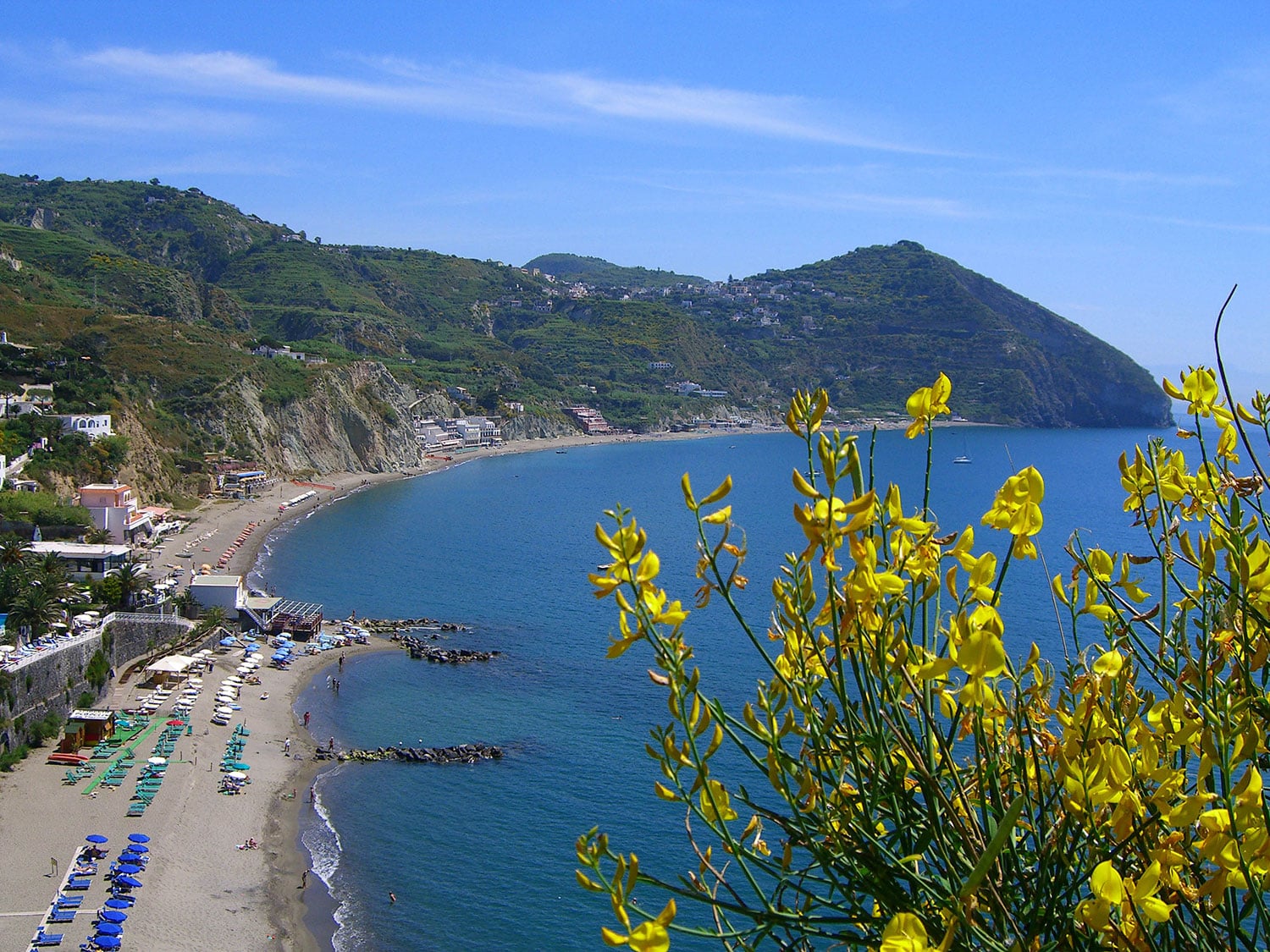
Legend has it that the island of Ischia formed after a rather gruesome battle between the monster Typhon and the original G.O.A.T, Zeus, over the imprisonment of the Titans. After a sneaky assist from son Hermes, Zeus eventually cast Thyphon into the underworld and condemned him to spit flames and shake the earth, making him the de-facto ruler of volcanic forces.
Later, the island would be the home of the sorceress Circe and she would extend her hospitality to the wayward Odysseus, who really needed any port in the storm. Legend also has it that he spent a year on the island and felt particularly at ease, though never too far away from the wrath of the great god Poseidon, ruler of the sea and father to that poor Cyclops whom Odyessus had rather unkindly blinded. Upon these and countless other legends, the Myth of Ischia was born.
As it happens, Poseidon is also the ruler of horses and if he ever wanted to manifest back in this universe he could do worse than to inhabit the body of Equestrian artist and performer Bartolo Messina. Indeed, one look at him and you would not be blamed for thinking that the great Neptune had already made the jump. He is as mythical looking as a person can be before they make that actual leap into divinity, and he is just as compelling. If the goddess of bread and hatchbacks is the one who welcomes seekers to the island of Ischia, Bartolo Messina is the one who helps them find what they've come for.
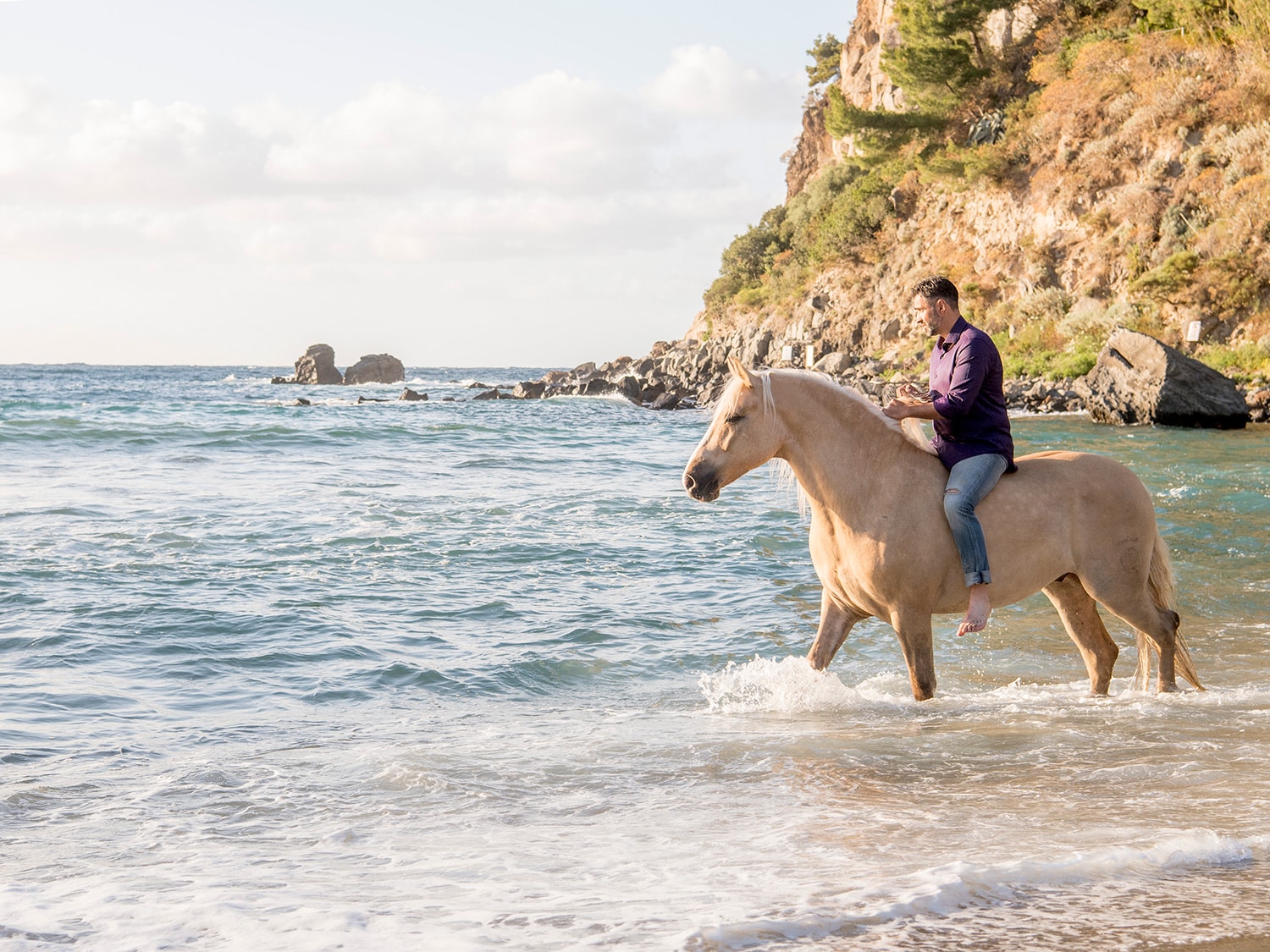
Both Michele and I couldn't help but stare up at him, and not just because we stood at the lower angle of a precipitous driveway. He towered above us, almost merging with the tumultuous sky behind him, broad-shouldered and clad in Gore-Tex because when you already look every inch the knight, there's no need for shining armor.
The child of an American mother and a Sardinian father, Messina grew up on the island of Ischia surrounded by family, friends, and horses. As we walk around his farm and meet each of them, he apologizes in advance for his English and then proceeds to speak it perfectly. "When I was a child, Ischia was a different place. It was much more innocent and although there were tourists, it was a different sort of interaction. Things were slower, more genuine."
Though Ischia has nowhere near the traffic or notoriety of its neighbor Capri, it is nonetheless a bustling destination. When the spring and summer are abuzz with tourists and families, the hydrofoils and ferries spillover on trips to and from the mainland. Once the waves of visitors ebb with the autumn tides, the schedule slows to a crawl, and with it so too do the opportunities to pick up provisions that might not be available in the small hardware stores or supermarkets. Visiting here is an adventure in itself; living here is slightly, though positively, mad. Why then, would a man whose career involves transporting horses all over the world choose to move his entire operation to a place like this?
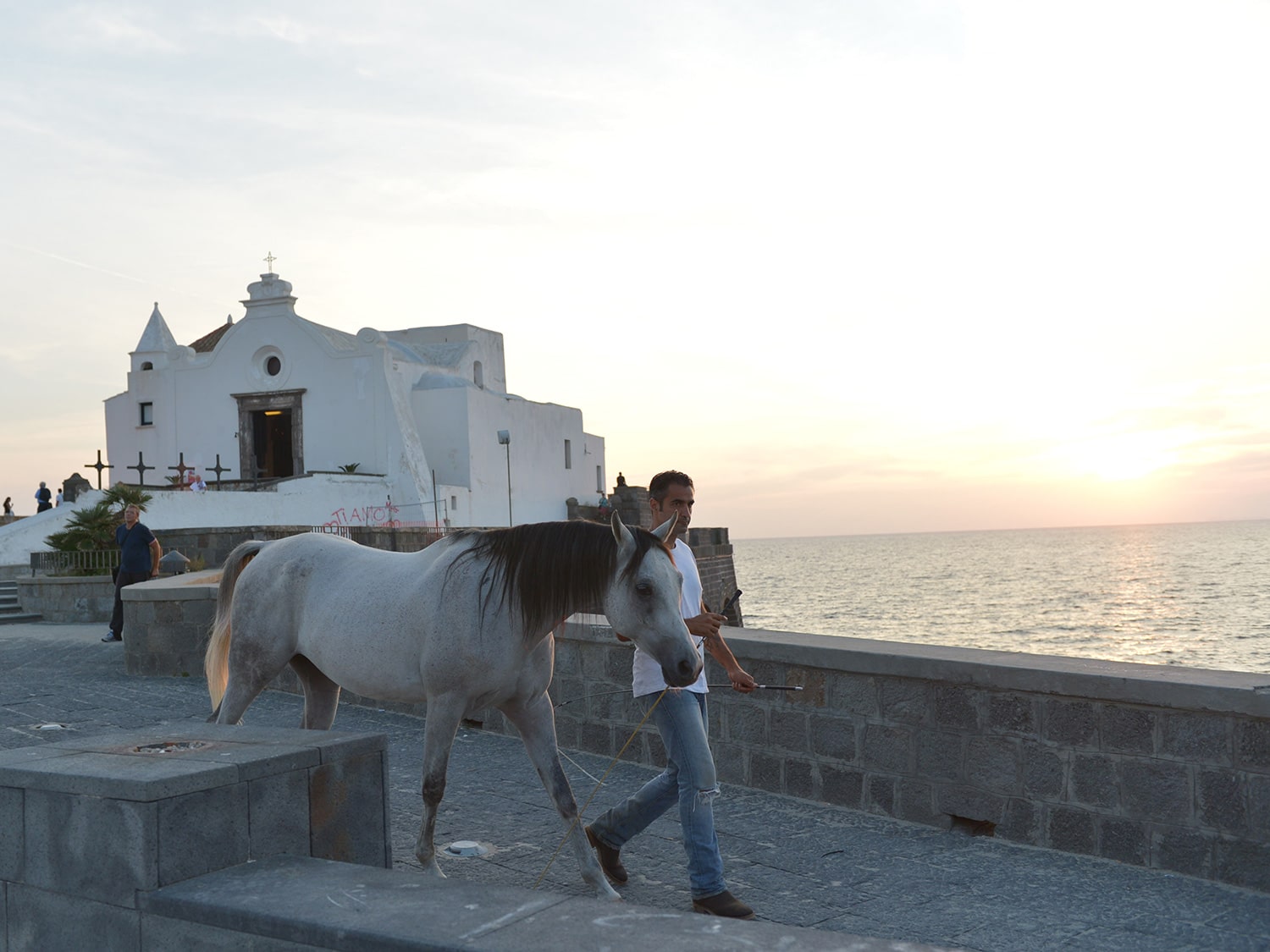
To be fair, Messina is not just any man, and Ischia is not just any place. And after a lifetime spent traveling the globe his choice to return to the island was a well-informed one. "I lived in Australia for two years when I was 20 years old and spent a lot of time in America, particularly in New York. And of course, I've had my adventures in Dubai, and in Asia. And they were beautiful places, all of them. But Ischia is different. Perhaps it's because I was born here, but for me, it's magic."
Messina grew up with the horses that his father and uncle owned, and he would play on the beach with them during the winter months, far from the madding crowds. While other boys his age were playing soccer or getting into the requisite troubles that not even an island can remain immune from, he was learned to speak and listen to these great creatures. After a stint as a riding instructor and guide through the Australian outback, he began performing liberty dressage with the international company Cavalluna.
Liberty dressage involves working with a horse to perform complex routines without the aid of saddles or bridles. Instead, it is dependent on a sort of racial communion between horse and trainer that relies on body language, eye contact, and tone of voice. It is one that comes entirely naturally to Messina; contrary to the relationship between other show animals and their trainers, his horses are entirely free to live and work with him.
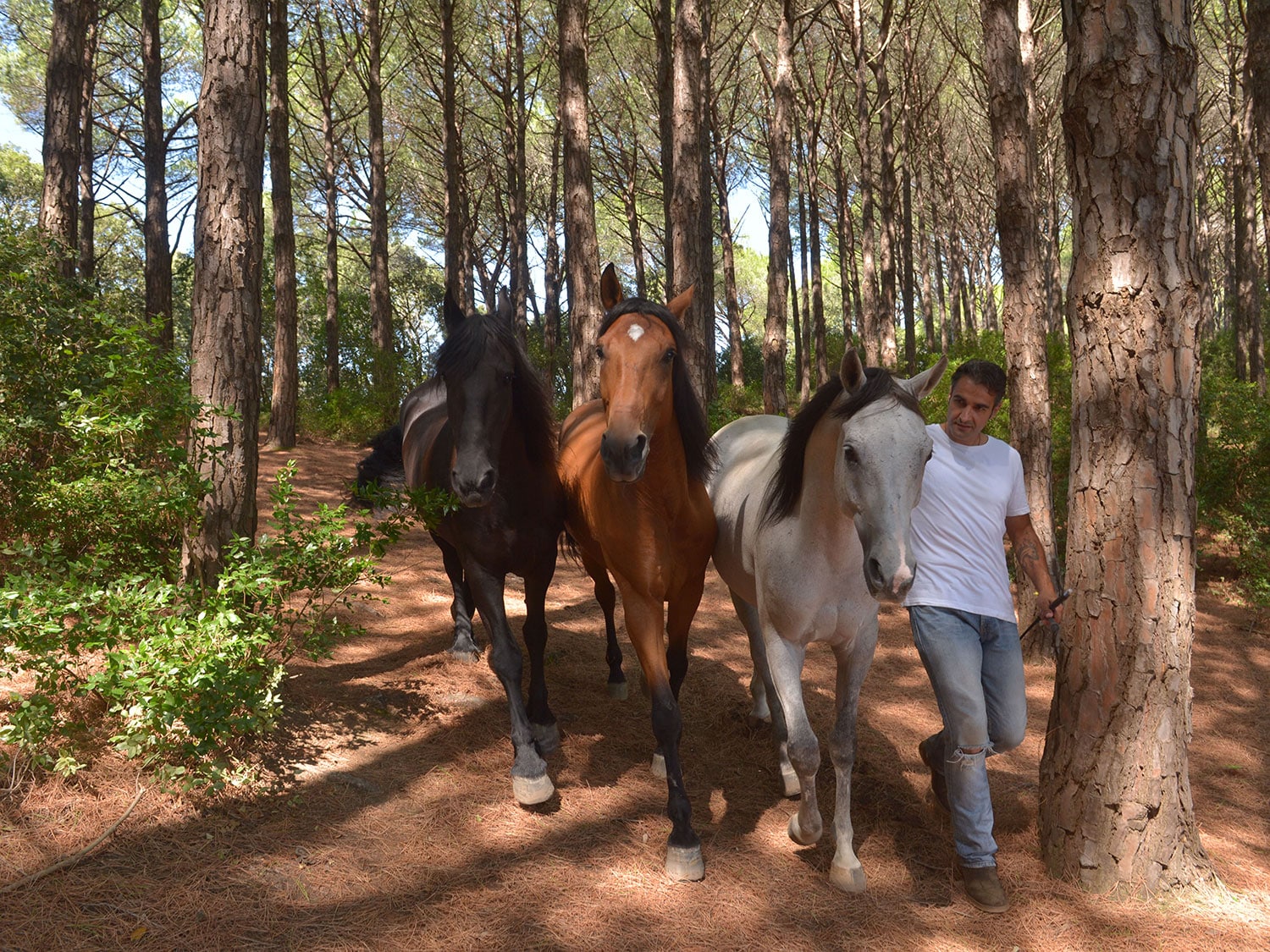
"Horses have lived alongside mankind for five thousand years, they are a part of us, they are a part of me. They decide to work with me, they are free." His equestrian center, Aragonas Arabians, is also his home, where he and his wife are raising their children to develop the same connection to horses. And while it is in one of the most inaccessible points on an occasionally inaccessible island, there is no other place that Bartolo Messina could imagine this relationship.
"Of course, it would be much easier to keep the horses in Rome, or somewhere else. But I choose to keep the horses in Ischia because it's quiet, and they can feel that. It's quiet, and that's good for them. Everything you see here, I've built myself, with my hands. Even the stable. Because even that, they can feel. They know I built this for them, for us."
Messina's words are moving, but none of them could prepare me for the sight of actually seeing him on a horse, riding through the thick woods that ring his farm on the very crown of Ischia. Time seemed to stop, and I could swear that the breeze running through the trees had been sent straight to us by whatever god or goddess was on duty that day. It was almost terrifying to see the sheer power that man and horse radiated and which seemed to emanate from the volcanic soil itself.
But islands, as Truman Capote wrote during his own stay on Ischia, "are like ships at permanent anchor...one is seized by the same feeling of charmed suspension: it seems nothing unkind or vulgar can happen to you." Watching the clouds churn overhead, the leaves blow underfoot, and the horses run free at Aragonas Arabians, fear was far away, somewhere offshore and distant.
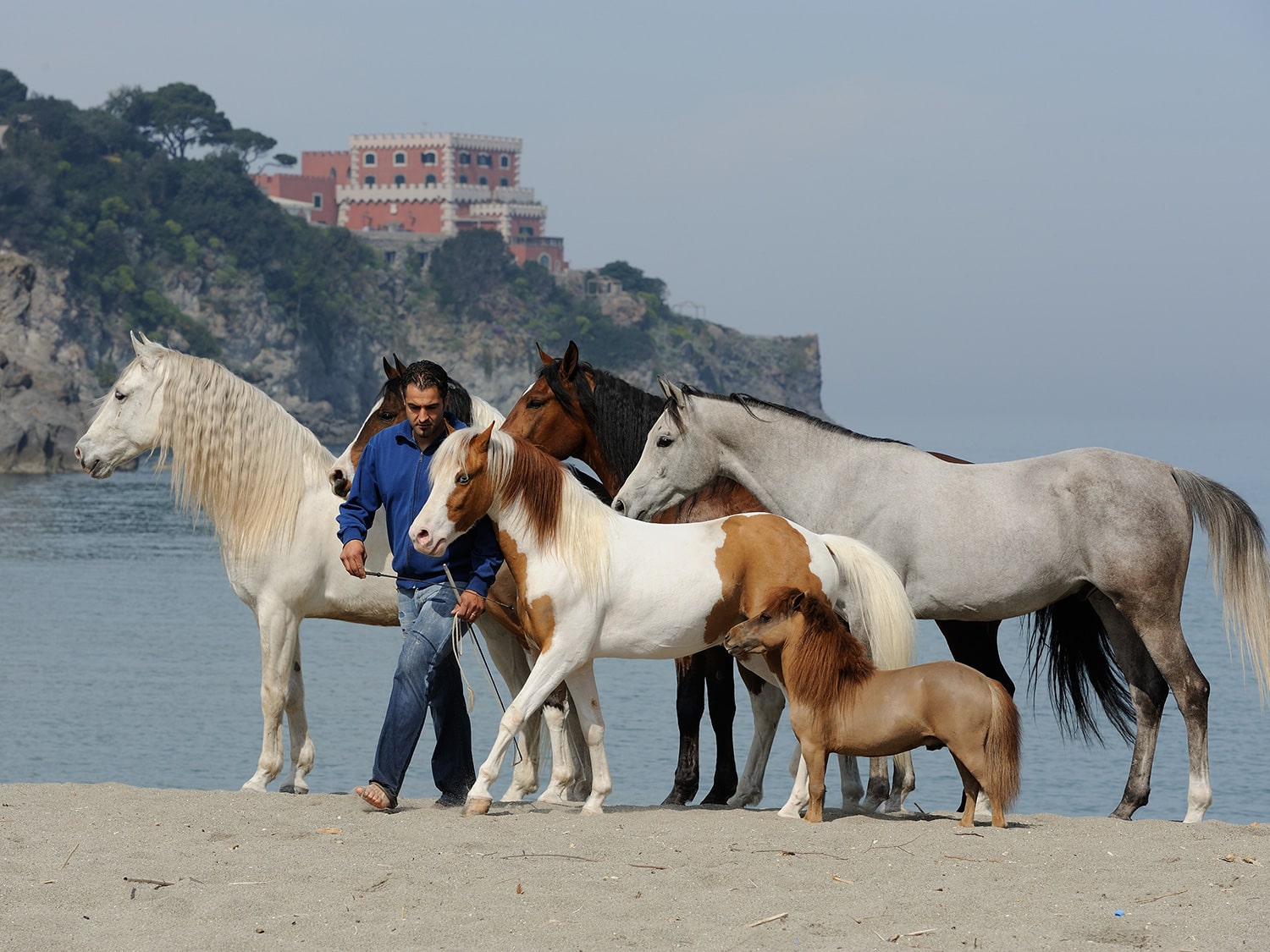
After ducking inside to escape the bitter wind that had begun to blow, Messina mused over the past and the future, twin sirens that danced overhead like the steam from our respective mugs of tea. His dream is to bring a different kind of tourism to Ischia, one that evokes the travelers he grew up seeing, people who were less interested in disposable memories and more inclined towards experiences.
"I want to build a place where people can come and bring their horses and live the island with me. You can sleep anywhere you want, but then we ride together and see this island through each other's eyes, and through the horse's eyes. It is a sort of Academy, but not just for training. For the soul."
At a time when countries all over the world are rethinking tourism and Ischia itself is looking for ways to be more sustainable, his words echo across the Bay and back onto mainland Italy. Indeed, it may just be that by allowing people to live his island through and with him, Bartolo Messina's model offers another way, a slower way, a richer way. Ultimately, it may just be a better way.
Of course, bringing a new generation of seekers and horse whisperers to Ischia isn't his only dream. As the tea cools and the wind begins to die down slightly, he muses over the road which has led him here, back home. "Ever since I was young, I've always wanted to make an entire horse show in Madison Square Garden. It's more than a dream, it's just something I've always imagined doing. It's a little bit complicated but let's see. You never know, right?"
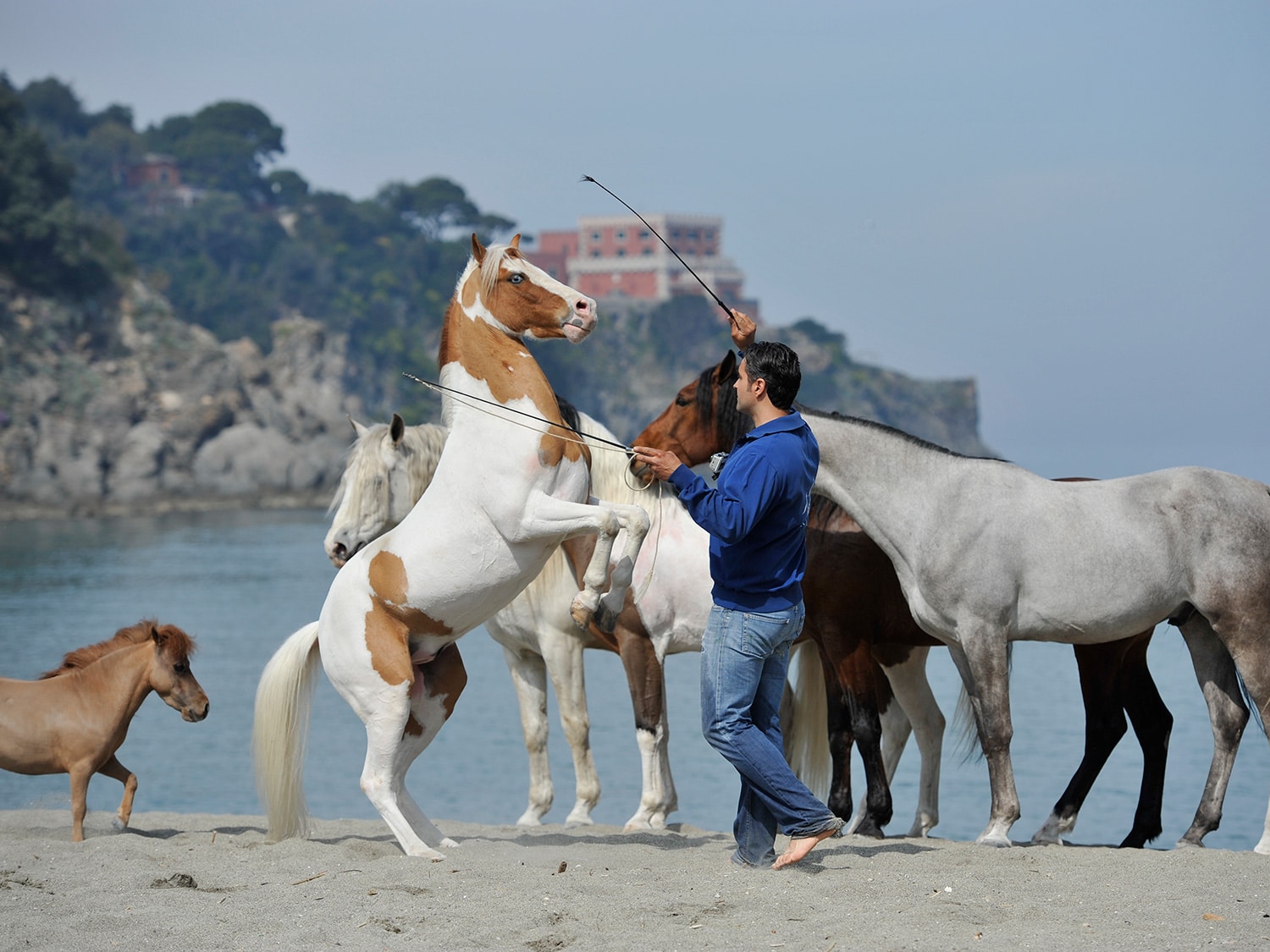
As the clouds continued swarming overhead the promise of coniglio all'ischitana, the stewed rabbit that is arguably the most famous dish on the island, beckoned us to take our leave. Though we invited him to join us for the meal that Michele's mother was preparing and for which she was also quite famous, the rather punishing schedule of maintaining a stable of horses meant that such excursions were few and far between.
As we walked down the driveway and began to descend back down towards the sea and earth below, I could imagine Messina under the bright lights of Madison Square Garden, beckoning his horse to him. But it was here, on this island, tucked into an ancient corner of an ancient world, that he was also allowed to run free. "What else do you have planned for your time here?" He asked with such genuine interest that I felt awful telling him that I'd be leaving the following day.
"You must come back again then and spend some time in the thermal waters. It is the most important natural resource in Ischia, and it will cure whatever ails you, guaranteed." Ischia's curative waters have made Ischia a hidden jewel where everyone from Ancient Greeks to modern-day Romans come to soothe their souls and heal their bodies. I made him a promise to return and as we descended back towards our Fiat Panda, itself a piece of lime-green divinity, he called out, "If you do get a chance to go to a thermal park, go to Poseidon. It's the best one on the island, trust me." I could swear I saw him wink, and as he turned to walk back towards the home that he had built with his own hands and dreams, I had no doubt.
After all, he would know.
